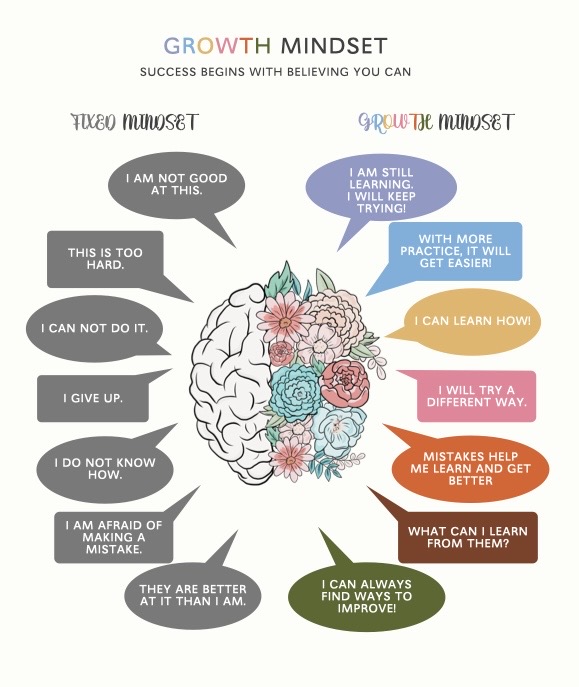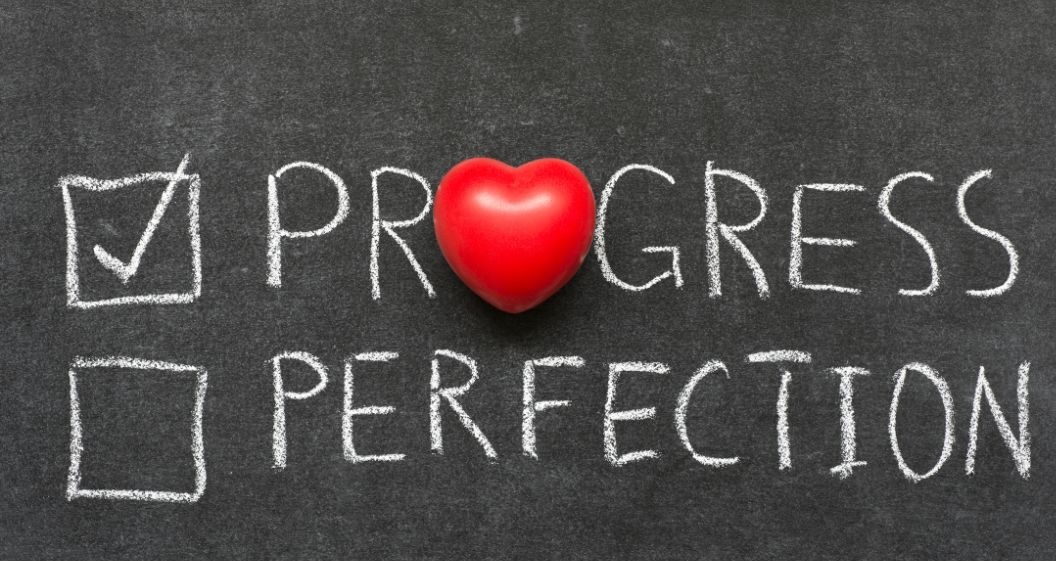
If you're like me—a woman over 35—focusing on health, you know it isn’t just about looking good;
It’s about feeling amazing and living a full, balanced life.
Let’s be real—starting (or sticking to) a health journey can feel overwhelming when you're juggling work, family, and all the daily responsibilities. Some days, I honestly can’t even remember what I got done or what went right or wrong! I’m just busy—but for what? That’s where a growth mindset comes in to make things easier and more manageable.

A growth mindset, a concept by Carol Dweck (Mindset: The New Psychology of Success), is the idea that your abilities and skills aren’t set in stone—you can develop them through hard work and dedication. And it’s not just for high achievers or successful people. It's for anyone who wants to improve their everyday life, tackle new challenges, and experience personal growth.
If you’re looking to set your health goals and actually stick to them, or if you aspire to be one of those moms on Instagram who seems to have it all together (even if it’s not always real), you can absolutely become that person! By embracing a growth mindset, you can prioritize self-care, celebrate progress over perfection, and build the resilience needed to stay on track.
In this article, we’ll dive into how adopting a growth mindset can change the way you approach your health and wellness goals. We’ll cover practical tips, mindset statements, and easy exercises to help you let go of self-limiting beliefs, tap into your full potential, and manage the realities of busy life. Ready to get started? Let’s go!
Prioritizing Self-Care: A Growth-Oriented Mindset for Health
Women often place others' needs above their own, and it’s easy to neglect self-care. However, a growth mindset encourages you to prioritize your health and well-being, not as a selfish indulgence, but as an essential part of being the best version of yourself.
Here are examples of fixed mindset vs growth mindset when it comes to women and self-care:
Fixed Mindset:
- “I don’t have time for myself; everyone else’s needs come first.”
- “If I take time for self-care, I’m being selfish.”
- “I’m not good at sticking to healthy habits, so why even try?”
- “I’ll never be as fit or healthy as other women, so what’s the point?”
- “I failed to stick to my workout plan this week, so I might as well give up.”
In a fixed mindset, there's a tendency to believe that taking time for yourself is indulgent or unimportant. You might feel stuck or discouraged by setbacks, thinking that health is something you either have or don’t, rather than something you can work on over time.
Growth Mindset:
- “Taking care of myself helps me take better care of my family and responsibilities.”
- “Self-care is not selfish; it’s essential for my health and happiness.”
- “I can improve my habits, even if it’s just one small step at a time.”
- “Every woman’s health journey is different, and I’m making progress in my own way.”
- “I missed a few workouts this week, but I can start fresh tomorrow.”
With a growth mindset, you understand that taking care of yourself is key to being your best self. You view setbacks as learning experiences and see self-care as a necessary part of life, not something to feel guilty about. You also recognize that small, consistent changes add up to long-term success.
Here’s a simple growth mindset exercise to start your day. Start each day with a growth mindset activity like writing down positive affirmations that help reframe how you see your health journey. Here are a couple of examples:
- “I am capable of prioritizing my health today, even if it’s just 10 minutes of movement.”
- “Every small step I take is progress, and I’m proud of my efforts.”
These mindset statements help shift your current mindset from feeling overwhelmed or stuck in a comfort zone to feeling empowered and ready to take small steps toward your personal growth and self-care. Over time, this positive outlook will help you build the resilience and motivation you need to stay on track with your health goals.
Progress Over Perfection: Embracing the Learning Process
One of the hallmarks of a growth mindset is the love of learning and the ability to see progress as more important than perfection. For women over 35, this is crucial, especially when it comes to health and fitness goals.
A fixed mindset might lead you to think, “I’ll never be as fit as I want to be,” or “I’ll never be able to stick to a routine.” But with a growth-oriented mindset, you focus on the process, not just the end result. Small, consistent steps—like incorporating a 10-minute workout into your routine or making one healthy swap in your diet—are signs of progress, even if they don’t seem like big changes.
Here’s a fun way to practice this: Growth mindset activities can include tracking your small wins in a journal. Each week, write down one new thing you did to improve your health, whether it's trying a new recipe, taking a yoga class, or simply drinking more water. Celebrate these small victories and recognize that they are steps toward your larger goals.
Remember, it’s about the ongoing process—there’s no “perfect” health journey, but there is personal development and continuous improvement.
Setting Realistic Goals: Sustainable Changes for a Healthy Lifestyle
A big part of developing a growth mindset for your health is about setting realistic goals that truly fit your lifestyle and needs. Instead of getting swept up in trends or feeling pressured by what others are doing, it’s all about what works for you.
Let’s break it down:
Fixed vs. Growth Mindset Goals:
-
Fixed Mindset Goal: “I need to lose 15 pounds in a month.” This kind of goal can feel overwhelming and might lead to frustration if you don’t see immediate results.
-
Growth Mindset Goal: “I want to boost my energy levels.” This goal focuses on how you feel rather than just numbers on a scale, making it more achievable and enjoyable.
Setting Goals for Personal Growth:
Rather than fixating on strict diets or specific weight loss numbers, try to focus on goals that enhance your overall well-being. Here are some examples:
- Energy Boost: Aim to incorporate more whole foods into your diet, which can help increase your energy levels throughout the day.
- Mental Clarity: Set a goal to practice mindfulness for just 5 minutes a day, which can improve focus and reduce stress.
- Strength Building: Instead of committing to a rigorous workout plan, start with the goal of doing strength exercises twice a week.
Creating Your Action Plan:
Once you have your goals, it’s helpful to create an action plan. Think of it as breaking your bigger goals into smaller, bite-sized steps that you can easily manage. Here’s how you can do it:
-
Start Small: If your goal is to exercise more, begin by scheduling just two 20-minute workouts per week. This is manageable and not overwhelming.
-
Gradually Increase: As you start to feel comfortable with those two workouts, add in another day or increase the duration to 30 minutes. You can even experiment with different types of workouts, like yoga, walking, or strength training, to find what you enjoy most.
-
Celebrate Progress: Every time you complete a workout or stick to your healthy eating plan, celebrate that success! It can be as simple as treating yourself to a relaxing bath or watching your favorite show.
-
Be Flexible: Life happens, and that’s okay! If you miss a workout or indulge in a treat, don’t beat yourself up. A growth mindset is about learning from those moments and moving forward. Just ask yourself what you can do differently next time.
by taking a growth-oriented approach to your health goals, you’re not just aiming for immediate results; you’re investing in your overall well-being and happiness. And that’s a win for you and everyone around you!
Building Resilience: Bouncing Back from Setbacks
Life can be full of challenges, especially when it comes to our health journeys. One of the best parts of having a growth mindset is learning to build resilience when things don’t go as planned. A fixed mindset might lead you to think that one bad day, a missed workout, or an indulgent meal means you’ve failed. But a growth mindset sees these moments as opportunities to learn and grow.
Embracing Setbacks as Learning Opportunities
When you hit a bump in the road, think about how you can react positively. For example, if you had a hectic week and skipped the gym, instead of feeling defeated, ask yourself, “What can I do differently next week?” Maybe you could prep quick workouts for busy days or find a workout buddy for accountability.
Here are a couple of relatable scenarios:
-
Eating Out: If you indulged in takeout instead of cooking, instead of labeling yourself as “bad,” ask, “What made it hard to cook this week?” This can lead to meal planning or keeping healthy options on hand.
-
Missing Workouts: If you missed a few workout sessions, think, “Life happens! I’ll plan shorter workouts that fit my schedule.” This keeps you solution-oriented.
Using Positive Thinking Exercises
Incorporating growth mindset interventions like positive thinking exercises can help shift your perspective. Write down some mindset statements, such as:
- “I didn’t stick to my routine this week, but I’ll adjust for next time.”
- “Setbacks are part of the journey, and I’ll keep moving forward.”
These statements serve as pep talks, helping you stay positive.
The road to better health is an ongoing journey filled with ups and downs. By viewing setbacks as learning opportunities, you’re not just building resilience; you’re nurturing a healthy mindset. So next time you face a challenge, remember it’s part of your story, and you have the power to rewrite it. Embrace the challenges, learn from them, and keep moving forward. You’ve got this!
Developing a Positive Relationship with Food: Nourishment Over Restriction
Food is essential in any health journey, and a growth mindset can change how you view it. Here are some key points to illustrate this shift:
Embracing Food as Nourishment
-
Guilt-Free Indulgence: Enjoy a slice of birthday cake without guilt; it’s a celebration! Savor the moment and the joy it brings.
-
Nourishing Choices: When planning meals, prioritize variety. Instead of thinking, “I can’t eat carbs,” say, “I’m choosing this quinoa salad because it energizes me.”
Listening to Your Body
-
Mindful Eating: Slow down and appreciate your food. Identify different flavors and textures to foster gratitude.
-
Hunger Cues: Check in with your body throughout the day. Instead of waiting until you’re starving, grab a healthy snack like nuts or fruit when you feel slightly hungry.
Celebrating Nourishing Meals
-
Energy Boost: After a week of balanced meals, notice the increase in your energy. Acknowledge how whole foods enhance your workouts.
-
Strength and Recovery: Celebrate the benefits of protein-rich foods post-workout. Think, “This chicken stir-fry helps me recover and grow stronger!”
By focusing on nourishment instead of restriction, you can build a healthier relationship with food. Celebrate the energy and joy from eating well, embracing each meal as a step toward better health and well-being!
Mindfulness and Stress Management: A Key to Mental Well-Being
A healthy lifestyle isn’t just about physical health; it’s also about mental and emotional well-being. Mindfulness is a powerful tool that can help you manage stress, stay present, and reduce negative thoughts. Incorporating mindfulness activities like meditation, yoga, or even mindful eating can create a sense of balance and peace in your daily life.
When practicing mindfulness, focus on being in the moment. This helps you clear away negative or self-limiting beliefs that can sabotage your health efforts. It’s also a great way to cultivate a positive outlook and maintain a healthy mindset as you navigate your wellness journey.
Here are some short examples of mindfulness activities to support mental well-being:
-
Meditation: Spend just 5-10 minutes each day in a quiet space, focusing on your breath and letting thoughts come and go without judgment.
-
Yoga: Practice gentle yoga to connect your body and mind, helping release tension and promote relaxation.
-
Mindful Eating: Take time to savor each bite of your meals, paying attention to flavors and textures instead of multitasking.
-
Gratitude Journaling: Write down three things you’re grateful for each day to shift your focus toward positivity.
-
Nature Walks: Take a walk outside, noticing the sights and sounds around you to stay present and grounded.
-
Deep Breathing: Practice deep breathing exercises whenever you feel stressed to help calm your mind and body.
-
Digital Detox: Set aside time each week to unplug from devices and enjoy activities that bring you joy and peace.

The Power of Community: Support for Ongoing Growth
One of the best ways to support a growth mindset is by surrounding yourself with a supportive community. Whether it’s a high school basketball team, a group of friends, or a workout buddy, having team members who share your goals can make a big difference. Support systems are especially helpful when facing setbacks or trying to push out of your comfort zone.
When you share your health journey with others, you also gain access to valuable insights, new ideas, and encouragement. Whether you're celebrating wins together or learning from each other’s challenges, a strong community is a great way to keep yourself motivated and accountable.
Here are examples of mindset exercises to support a growth mindset through community:
-
Group Workouts: Join a fitness class or form a workout group with friends for accountability and motivation.
-
Health Challenges: Organize a friendly challenge, like drinking more water or trying new healthy recipes, and celebrate progress together.
-
Social Media Groups: Join online health and wellness communities to share your journey and gain inspiration from others.
-
Accountability Partners: Team up with a friend who has similar goals to check in regularly and support each other.
-
Mindfulness Meetups: Start or join a mindfulness group to practice meditation or stress-relief techniques together.
-
Recipe Swaps: Host a potluck where everyone brings a healthy dish to share, swapping recipes for fresh meal ideas.
-
Celebrate Wins: Create a "Win of the Week" tradition to share and celebrate each other's achievements, big or small.
Conclusion: Embrace the Growth Mindset for Lasting Health
The journey to better health is an ongoing process, but with the right mindset, it can be an exciting and rewarding one. Adopting a growth mindset means embracing new challenges, facing setbacks with resilience, and continually learning and improving. For women over 35, this mindset can be the key to unlocking not just better physical health, but also greater emotional and mental well-being.
So, as you move forward, remember to focus on progress over perfection, prioritize self-care, and set goals that promote personal growth. With a positive outlook, resilience, and the support of a strong community, there’s no limit to what you can achieve. Face new situations with an open mind, embrace continuous learning, and step into your full potential—your best, healthiest life is waiting for you.









